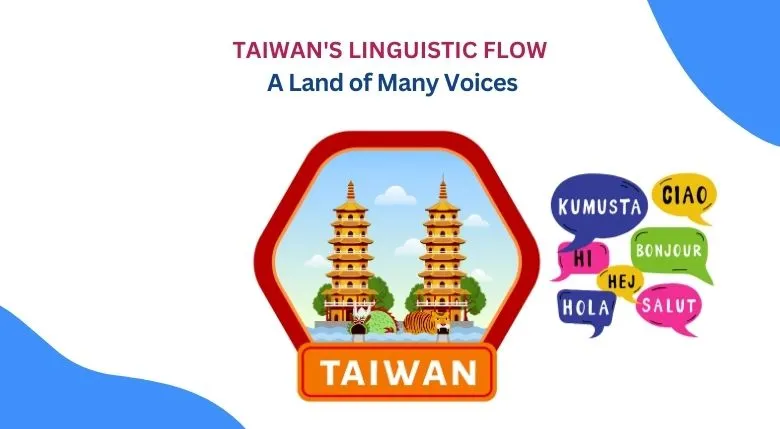 DeepL has officially announced its intention to enter Taiwan after expanding into Japan and South Korea. But why are big translation companies attracted towards Taiwan?
DeepL has officially announced its intention to enter Taiwan after expanding into Japan and South Korea. But why are big translation companies attracted towards Taiwan?
This is because Taiwan consists of various languages under the families of Austronesian languages and Sino-Tibetan languages. These languages have been spoken for thousands of years and are the foundation of Taiwan’s culture.
The island’s diverse linguistic landscape blends tradition with modern communication. And, Taiwanese Language Translation plays an important role in preserving this diversity, ensuring that locals and visitors understand the essence of each language.
Exploring Taiwan’s Linguistic Hub
In this blog, we will explore the many voices that make Taiwan a vibrant linguistic hub, showcasing the beauty of each language and its significance.
Mandarin: The Island’s Official Language
Mandarin is the official language of Taiwan and is widely spoken across the island. Schools use it as the language of instruction, and people commonly use it in media, business, and government communications. Mandarin language connects Taiwan with the broader Chinese-speaking world as the standard language, helping trade, education, and cultural exchanges. While its presence is dominant, it coexists harmoniously with other local languages, showcasing Taiwan’s respect for linguistic diversity.
Therefore, professional translators ensure accuracy and cultural sensitivity in communication across different sectors for those needing Mandarin assistance.
Taiwanese Hokkien: Heritage in Harmony
Taiwanese Hokkien is deeply rooted in the culture of southern Taiwan and represents the voice of many communities on the island. This language holds historical significance as families have passed it down through generations, preserving the island’s heritage.
People speak Taiwanese Hokkien in local markets, family gatherings, and traditional performances. It connects them to Taiwan’s past, reflecting the values and traditions of the people.
Today, the language continues to thrive, with efforts being made to promote and teach it, keeping this cultural treasure alive for future generations.
As Taiwanese Hokkien preserves cultural traditions, businesses looking to expand into international markets can also learn how to ensure their message resonates with diverse audiences across borders. Explore the significance of reaching new markets through Korean Content Translation: Why Does Your Business Require It the Most?
Ready to expand your business globally?
Connect with Taiwan’s languages through Somya Translators and build your worldwide business!
Hakka: Echoes of Ancestry
Hakka is another important language in Taiwan, primarily spoken by the Hakka ethnic group. Although Hakka-speaking people are fewer compared to Mandarin or Taiwanese Hokkien, it remains an essential part of Taiwan’s cultural fabric.
As a matter of fact, the Hakka people have a long history in Taiwan, contributing to the island’s agricultural and cultural development. Hakka language preservation efforts have gained traction in recent years, with schools and cultural programs working to ensure its continuity.
The language carries a strong sense of identity and belonging for the Hakka community, echoing their ancestral roots.
Indigenous Languages: Voices of the Earth
Taiwan’s indigenous languages comprise some of the oldest languages on the island. Spoken by the indigenous tribes, these languages are an integral part of Taiwan’s cultural landscape.
While these languages face challenges due to a decline in the number of active speakers, there is a strong movement to revive and protect them. Each indigenous language tells the story of a tribe, its traditions, and its connection to the land.
Government, professional Taiwanese language translation services, and community-led initiatives are making strides to ensure these voices continue to resonate through education and cultural programs.
English: The Global Link
English has become an important language in Taiwan, especially in international business, tourism, and education. Schools are increasingly adopting English as a key subject, and major cities are providing signage and services in English, reflecting its growing popularity.
For many, English unlocks global opportunities, helping Taiwanese people engage with the international community.
Today, Taiwanese businesses continue to expand their global presence. Therefore, English remains a vital tool for them, connecting the island with the rest of the world and facilitating cross-cultural communication.
As Taiwan strengthens its international ties, there’s a growing interest in exploring new markets, like the gaming industry. Businesses are now looking beyond English-speaking markets and tapping into regions like South Korea, where gaming thrives. Discover more about the potential of expanding into the Korean gaming market in our detailed guide on Korean Game Localization Service: Unveiling Ample Prospects to Discover the Gaming World.
Conclusion
Taiwan’s linguistic flow reflects its rich cultural history and connection to local traditions and global advancements. Each voice adds to the island’s identity, from the official use of Mandarin to the deep roots of Taiwanese Hokkien, Hakka, and indigenous languages. Professional translators from Somya Translators preserve and communicate these languages, ensuring that the essence of Taiwan’s linguistic diversity is understood worldwide.







